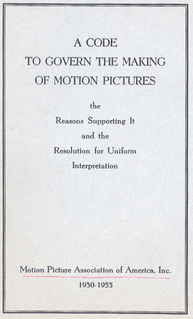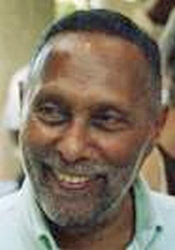Harlan Saperstein is an American voice actor. [1] He has worked as a television narrator of several documentaries on E! True Hollywood Story and History Channel. [2]
Harlan Saperstein is an American voice actor. [1] He has worked as a television narrator of several documentaries on E! True Hollywood Story and History Channel. [2]

The Book of Exodus is the second book of the Bible. It narrates the story of the Exodus, in which the Israelites leave slavery in Biblical Egypt through the strength of Yahweh, who has chosen them as his people. The Israelites then journey with the prophet Moses to Mount Sinai, where Yahweh promises them the land of Canaan in return for their faithfulness. There, they enter into a covenant with Yahweh, who gives them their laws and instructions to build the Tabernacle, the means by which he will come from heaven and dwell with them and lead them in a holy war to possess the land, and then give them peace.

Film noir is a cinematic term used primarily to describe stylish Hollywood crime dramas, particularly those that emphasize cynical attitudes and motivations. The 1940s and 1950s are generally regarded as the "classic period" of American film noir. Film noir of this era is associated with a low-key, black-and-white visual style that has roots in German Expressionist cinematography. Many of the prototypical stories and much of the attitude of classic noir derive from the hardboiled school of crime fiction that emerged in the United States during the Great Depression.

The Gospel according to Mark, also called the Gospel of Mark or simply Mark, is the second of the four canonical gospels and of the three synoptic Gospels. It tells of the ministry of Jesus from his baptism by John the Baptist to his death, burial, and the discovery of his empty tomb. There is no miraculous birth or doctrine of divine pre-existence, nor, in the original ending, any post-resurrection appearances of Jesus. It portrays Jesus as a teacher, an exorcist, a healer, and a miracle worker. He refers to himself as the Son of Man. He is called the Son of God, but keeps his messianic nature secret; even his disciples fail to understand him. All this is in keeping with Christian interpretation of prophecy, which is believed to foretell the fate of the messiah as suffering servant. The gospel ends, in its original version, with the discovery of the empty tomb, a promise to meet again in Galilee, and an unheeded instruction to spread the good news of the Resurrection of Jesus.

The Old Testament is the first division of the Christian biblical canon, which is based primarily upon the 24 books of the Hebrew Bible or Tanakh, a collection of ancient religious Hebrew writings by the Israelites. The second division of Christian Bibles is the New Testament, written in the Koine Greek language.

Yahweh was the national god of ancient Israel and Judah. The origins of his worship reach at least to the early Iron Age, and likely to the Late Bronze Age. In the oldest biblical literature, he is a storm-and-warrior deity who fructifies the land and leads the heavenly army against Israel's enemies; at that time the Israelites worshipped him alongside a variety of Canaanite gods and goddesses, including El, Asherah and Baal; in later centuries, El and Yahweh became conflated and El-linked epithets such as El Shaddai came to be applied to Yahweh alone, and other gods and goddesses such as Baal and Asherah were absorbed into Yahwist religion.

Joseph Michael Straczynski is an American filmmaker, and comic book writer. He is the founder of Synthetic Worlds Ltd. and Studio JMS and is best known as the creator of the science fiction television series Babylon 5 (1993–1998) and its spinoff Crusade (1999), as well as the series Jeremiah (2002–2004) and Sense8 (2015–2018). He is also the executor of the estate of Harlan Ellison.

Noah's Ark is the vessel in the Genesis flood narrative through which God spares Noah, his family, and examples of all the world's animals from a world-engulfing flood. The story in Genesis is repeated, with variations, in the Quran, where the Ark appears as Safinat Nūḥ and al-fulk.

The Motion Picture Production Code was a set of industry guidelines for the self-censorship of content that was applied to most motion pictures released by major studios in the United States from 1934 to 1968. It is also popularly known as the Hays Code, after Will H. Hays, president of the Motion Picture Producers and Distributors of America (MPPDA) from 1922 to 1945. Under Hays's leadership, the MPPDA, later the Motion Picture Association of America (MPAA), adopted the Production Code in 1930 and began rigidly enforcing it in 1934. The Production Code spelled out acceptable and unacceptable content for motion pictures produced for a public audience in the United States.
Docudrama is a genre of television and film, which features dramatized re-enactments of actual events.

A Bible conspiracy theory is any conspiracy theory that posits that much of what is believed about the Bible is a deception created to suppress some secret, ancient truth. Some of these theories claim that Jesus really had a wife and children, or that a group such as the Priory of Sion has secret information about the true descendants of Jesus; some claim that there was a secret movement to censor books that truly belonged in the Bible, etc.

Mark Burnett is a British television producer who is the current Chairman of MGM Worldwide Television Group. He is best known for creating and producing the reality show The Apprentice, along with Survivor, The Voice, and Shark Tank.

Stuart Henry McPhail Hall was a Jamaican-born British Marxist sociologist, cultural theorist, and political activist. Hall, along with Richard Hoggart and Raymond Williams, was one of the founding figures of the school of thought that is now known as British Cultural Studies or the Birmingham School of Cultural Studies.

Screenwriting or scriptwriting is the art and craft of writing scripts for mass media such as feature films, television productions or video games. It is often a freelance profession.

The Exodus is the founding myth of the Israelites. It tells a story of Israelite enslavement and departure from Egypt, revelations at biblical Mount Sinai, and wanderings in the wilderness up to the borders of Canaan. Its message is that the Israelites were delivered from slavery by Yahweh their god, and therefore belong to him by covenant.
The Da Vinci Code, a popular suspense novel by Dan Brown, generated criticism and controversy after its publication in 2003. Many of the complaints centered on the book's speculations and misrepresentations of core aspects of Christianity and the history of the Catholic Church. Additional criticisms were directed toward the book's inaccurate descriptions of European art, history, architecture, and geography.
Decoding the Past (2005–2008) is a History Channel paranormal television series that "decodes" the past by looking for unusual, and mysterious things written throughout history that may give clues as to what will happen in the future.

Graham S. Phillips is a British author. Phillips has a background working as a reporter for BBC radio, and he was the Founding Editor (1979) of Strange Phenomena magazine. He has made a number of controversial claims concerning the Arthurian legend, such as the discovery of the 'Hawkstone Grail', a small stone cup that he claims is the original Holy Grail; the identification of a Roman ruin as the "historical Camelot"; and the claim to have discovered King Arthur's grave. He has also investigated various biblical mysteries, again presenting some controversial theories, such as an alternative location for Mount Sinai at Petra in Jordan, an Egyptian staff in a British museum as the staff of Moses, and a grave on the British island of Anglesey as the tomb of the Virgin Mary.
Saperstein is a surname.
Alessandro Portelli is an Italian scholar of American literature and culture, oral historian, writer for the daily newspaper il manifesto, and musicologist. He is a professor of Anglo-American literature at the University of Rome La Sapienza. In the United States he is best known for his oral history work, which has compared workers' accounts of industrial conflicts in Harlan County, Kentucky, and Terni, Italy. In 2014–15, he was a visiting professor in the Department of Sociology at Princeton University, co-teaching a course on Bruce Springsteen's America.